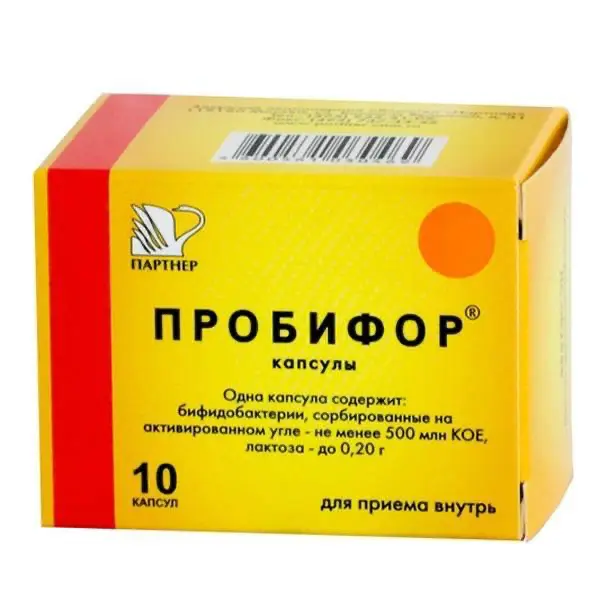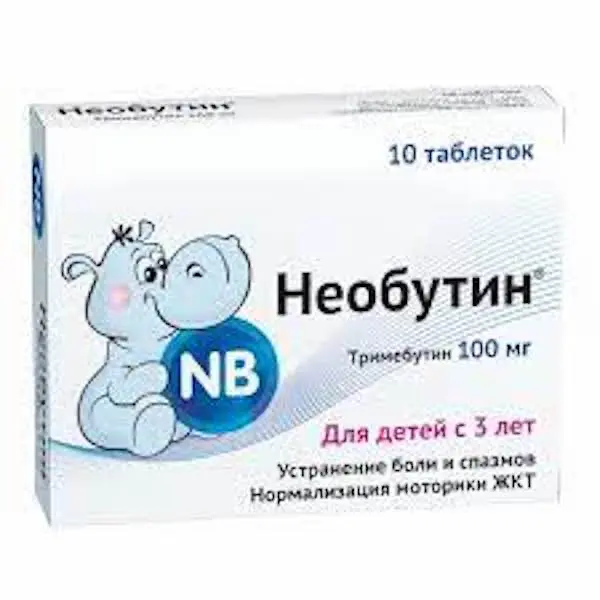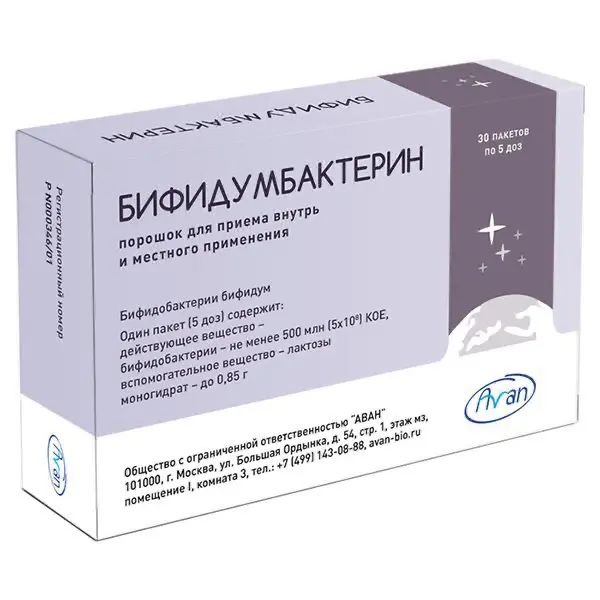Description
Probifor Pharmacodynamics
BIOLOGICAL PROPERTIES
Antidiarrheal action of the drug is due to the high concentration of bifidobacteria (Bifidobacterium bifidum № 1) sorbed on particles of activated charcoal, which are antagonists of a wide range of pathogenic (shigella, salmonella, Staphylococcus aureus, etc.) and conditionally pathogenic microorganisms (protists, Klebsiella etc.).
Antiinfective effect of the drug is enhanced by sorption of bifidobacteria on charcoal particles which leads to accelerated normalization of gastrointestinal tract microbiocenosis, activation of restorative processes in mucous membranes and increasing anti-infective resistance of the body. Antitoxic effect of the drug is provided by rapid repopulation of the intestine microcolony bifidobacteria, the restoration of normal microflora, which prevents the penetration of toxins in the internal environment of the body and, as a natural biosorbent, accumulates a significant amount of toxic substances coming from outside or formed in the body. Bifidobacteria in high concentrations activate intestinal parietal digestion, synthesis of vitamins and amino acids, enhance the protective function of the intestine and the body’s immune defense
Indications
– Diarrhea of various etiologies;
– food toxic infections;
– Acute intestinal infections of bacterial and viral nature (salmonellosis, shigellosis, enterocolitis, caused by pathogenic Enterobacteriaceae or staphylococcus aureus, rotavirus infection) or undetermined etiology;
– Dysbacteriosis of various etiologies, including those developed against the background of and after taking antibiotics, cytostatic, radiation therapy; complicating the course of viral hepatitis, cirrhosis of the liver, intestinal diverticulosis of various localizations;
– Newborns (including prematurely born) children with a burdened premorbid background, starting from the period of stay in the maternity hospital, to improve the adaptation period, as well as with pronounced dysbacteriosis;
– pregnant women in preparation for childbirth, cesarean section and in the postoperative period.
The drug is used in the treatment of
– Chronic infectious and non-specific inflammatory diseases of the digestive tract (gastroduodenitis, pancreatitis, proctosigmoiditis, colitis, including ulcerative colitis);
– patients with secondary immunodeficiency states, with severe infectious-inflammatory and purulent-septic diseases (sepsis, peritonitis, etc.); with skin diseases (atopic dermatitis, streptoderma, eczema);
– irritable bowel syndrome;
– Acute respiratory viral infections and influenza;
– surgical patients (including trauma patients) for preoperative preparation and prevention of postoperative complications; in postgastroresection disorders and conditions after cholecystectomy;
– cancer patients during chemotherapy, radiation therapy, before and after surgery.
Contraindications .
Congenital lactase deficiency, glucose-galactose absorption disorders, hypersensitivity to the drug components.
How to use and dosages
- The drug is used in children from infancy and adults. In acute intestinal infections, food poisoning, diarrhea:
- – Children under 6 months: 1 capsule 2 times a day, children over 6 months: 1 capsule 3-4 times a day (possibly at short intervals of 2-3 hours), the course of 2-3 days, when clinical symptoms persist, the treatment is lengthened to 4-5 days;
- – Children over 7 years of age and adults 2-3 capsules 2 times a day, the treatment course of 3-5 days,
- – Adults to stop diarrhea in the early days of the disease in 3 capsules 2 times a day at an interval of 30 minutes to 1 hour, the dosage can be increased to 6 capsules at a time once a day, treatment for 1-3 days.
- In chronic diseases of the gastrointestinal tract, irritable bowel syndrome – children 3 capsules once in the evening meal, adults take 3 capsules once or 2 capsules 2 times a day. The course of treatment is 5-15 days. With severe disease, the drug can be increased for adults and children up to 6 capsules daily and the treatment course to 30 days.
- Dysbacteriosis of various etiologies, chronic intestinal infections, patients with immunodeficiency disorders, skin diseases, and to improve the course of the period of adaptation in infants:
- – Premature infants 1 capsule 1-2 times a day;
- – Premature infants and children under 3 years old – 1 capsule 2 times a day;
- – Children from 3 to 7 years – 1 capsule 3 times a day;
- – Children over 7 years of age and adults 2-3 capsules 2 times a day. The course of treatment is 7-10 days.
- In the complex treatment of acute respiratory viral infections and influenza patients of all age groups from 1-2 days of the disease in one capsule 3 times a day. The course of treatment is two days.
- Surgical patients and pregnant women in preparation for cesarean section to reduce postoperative complications:
- – Before surgery, 1 capsule 3 times a day for 2-3 days; persons suffering from intestinal dysbacteriosis, who received antibiotics and chemopreparations, preoperative course is extended to 7 days,
- – From 2-7 days after surgery, 1 capsule 3 times a day for 2-3 days, when indicated – 7-10 days
- Probifor® is taken orally with meals, if necessary, regardless of the meal, with water. Children and patients who can not swallow a whole capsule it is opened. The contents of the capsule is mixed with liquid food, preferably fermented dairy products, newborns and infants – with mother’s milk or formula for artificial feeding. You can mix the contents of the capsule with 10-50 ml of boiled water at room temperature, which forms a turbid suspension with particles of sorbent black. The resulting aqueous suspension should be drunk without achieving complete dissolution.





